
Leucadendron tinctum, the spicy conebush, is a flower-bearing shrub that belongs to the genus Leucadendron and forms part of the fynbos. The plant is native to the Western Cape, where it occurs in the Hex River Mountains up to Hottentots Holland Mountains and Langeberg. The shrub grows 1.3 m tall and bears flowers from July to August.
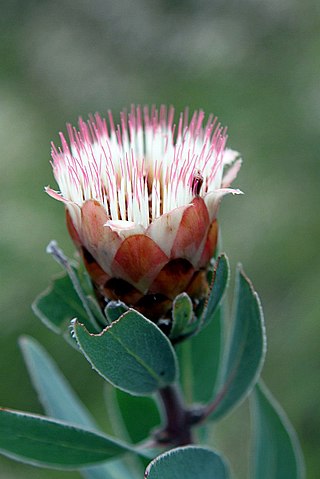
Protea subvestita, the waterlily sugarbush, is a flower bearing shrub that belongs to the well-known genus Protea. The plant is native to Lesotho and South Africa and occurs in Mpumalanga on the escarpment of the Wakkerstroom, Free State, KwaZulu-Natal, Eastern Cape, and the Klein Swartberg. The shrub is large, erect and grows up to 5 m. It flowers mainly from January to March.
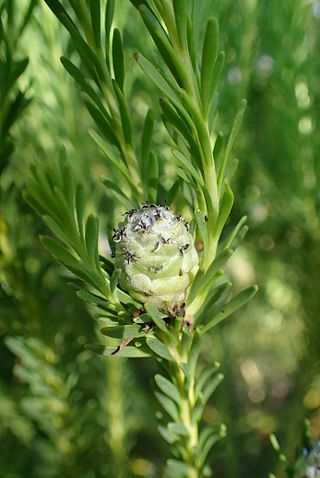
Leucadendron linifolium, the line-leaf conebush, is a flower-bearing shrub that belongs to the genus Leucadendron and forms part of the fynbos. The plant is native to the Western Cape, South Africa.

Leucadendron loeriense, the Loerie conebush, is a flower-bearing shrub that belongs to the genus Leucadendron and forms part of the fynbos. The plant is native to the Western Cape, where it is found in the Elandsberg, Baviaanskloof and Groot-Winterhoek mountains. The shrub grows 2.5 m tall and flowers in December and January.

Leucadendron floridum, the flats conebush, is a flower-bearing shrub belonging to the genus Leucadendron and forms part of the fynbos. The plant is native to the Western Cape, where it occurs in the Cape Flats, from Rondebosch to Kuils River and also in the Cape Peninsula around most wetlands. The shrub grows 2 m tall and bears flowers from September to October.
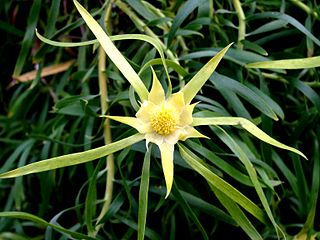
Leucadendron eucalyptifolium, the gum-leaved conebush, is a flower-bearing shrub belonging to the genus Leucadendron and forms part of the fynbos. The plant is native to the Western Cape and the Eastern Cape, where it occurs in the Potberg, Riversdal Plains, Langeberg, Outeniqua Mountains, Tsitsikamma Mountains, Kouga Mountains, Elandsberg, Swartberg, Waboomsberg, Warmwaterberg, Touwsberg, Rooiberg and Soetwaterberg. The shrub grows 4 m tall and bears flowers from July to October.
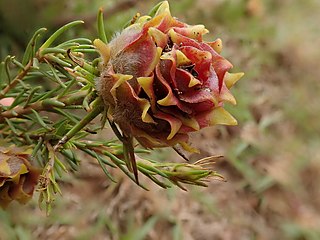
Leucadendron laxum, the Bredasdorp conebush, is a flower-bearing shrub belonging to the genus Leucadendron and forms part of the fynbos. The plant is native to the Western Cape, South Africa, where it occurs from Hermanus to Agulhas.

Leucadendron levisanus, commonly known as the Cape flats conebush, is a flower-bearing shrub that belongs to the genus Leucadendron and forms part of the fynbos. The plant is native to the Western Cape, where it occurs in the Cape Flats from Vishoek to Eerste River and Mamre. The shrub grows 2 m tall and bears flowers in October.

Dimorphotheca acutifolia is a plant belonging to the genus Dimorphotheca. The species is native to the Eastern and Western Cape Provinces.
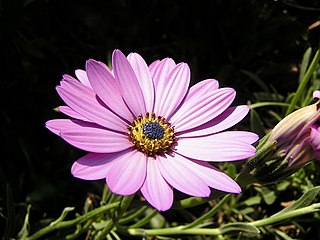
Dimorphotheca barberae is a plant belonging to the genus Dimorphotheca. The species is endemic to the Eastern Cape.
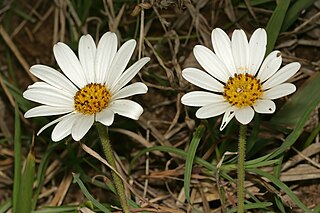
Dimorphotheca caulescens is a plant belonging to the genus Dimorphotheca. The species is endemic to the Eastern Cape, Western Cape and the Free State.
Berzelia cordifolia is a shrub that belongs to the Bruniaceae family. The species is endemic to the Western Cape and is part of the fynbos. The plant occurs from the Potberg in the De Hoop nature reserve to the Breede River estuary at Infanta. It has an area of occurrence of 150 km2 and there are eight subpopulations. The species is threatened by invasive plants and coastal development.

Clivia robusta is a plant and geophyte belonging to the genus Clivia. The species occurs in KwaZulu-Natal and the Eastern Cape from Pondoland and Port St. Johns to the uMzimkhulu River north of the Oribira Canyon and has an area of occurrence of 3,100 km2. There are currently less than ten subpopulations and the species has lost 30% of its habitat in the last 90 years due to overuse by traditional healers.
Erica amoena is a plant that belongs to the genus Erica and forms part of the fynbos. The plant is endemic to the Western Cape and occurs, among other things, in the Table Mountain National Park. The plant is considered rare.

Berzelia alopecuroides is a shrub that belongs to the Bruniaceae family. The species is endemic to the Western Cape and is part of the fynbos.

Watsonia tabularis, the Table Mountain watsonia is a plant that belongs to the genus Watsonia and forms part of the fynbos. The plant is endemic to the Western Cape.
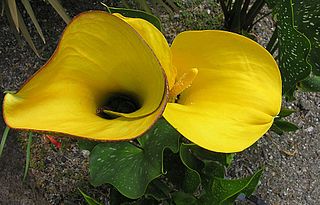
Zantedeschia jucunda, the Highveld golden arum, is a perennial, flowering plant and geophyte that is part of the Araceae family. The species is endemic to Limpopo and occurs on the summit of the Leoloberge. The plant has an area of occurrence of less than 380 km2. The plant is threatened by illegal collection by humans as well as mining and human activities.

Dimorphotheca venusta is a plant belonging to the genus Dimorphotheca. The species is endemic to the Western Cape and occurs in the Wemmershoek, Du Toitskloof and Hexrivier mountains at altitudes of 600 - 1,800 m. The plant is considered rare. The species was described by Nils Tycho Norlindh in 1980.
Berzelia burchellii is a shrub that belongs to the family Bruniaceae.
Berzelia ecklonii is a shrub that belongs to the Bruniaceae family. The species is endemic to the Western Cape and is part of the fynbos. The plant occurs in the mountains between Grabouw and Pringle Bay. It has an area of occurrence of 272 km2 and the plant is considered rare.
















